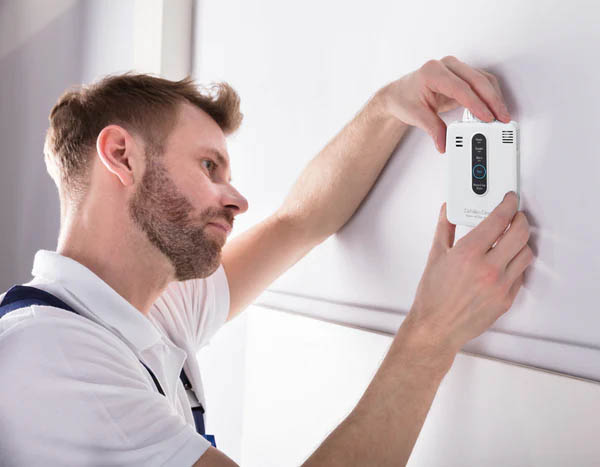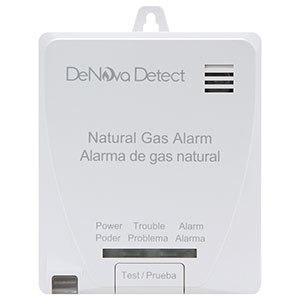Why Should I Be Worried About Natural Gas?
It has been estimated that the average American home uses at least one natural gas powered appliance daily. These can range anywhere between a gas oven in the kitchen to the clothes dryer in the utility room. The use or overuse of natural gas appliances can create the potential for a gas leak. While these gas appliances can be monitored with a detector, there are other hidden dangers to consider when addressing natural gas. Many homes are built around or above aging pipelines that are capable of emitting natural gas. The combination of a reliance on natural gas appliances and the presence of these pipelines creates a potentially catastrophic scenario.
Annually, over a dozen deaths can be linked to natural gas explosions. The number of injuries and hospitalizations is even higher with property damage costs exceeding the millions. The dangers of undetected natural gas in the home are well documented and need to be addressed properly. Recognized as the world leader in residential gas explosion prevention, New Cosmos is responsible for developing the world’s first residential gas alarm. DeNova Natural Gas Detectors by New Cosmos are easy to install and offer a faster response time when identifying natural gas in the surrounding area.
Where Do Natural Gas Leaks Occur in the Home?
A DeNova Battery Powered Gas Alarm should be installed in any room or area where there is potential for a gas leak to occur. Try to think of where most of your gas burning appliances are currently located. Better yet, let’s go over some of the more popular gas burning appliances on a room to room basis.
Kitchens
-
Natural gas ovens, cooktops and ranges remain a primary focus of concern. Their ability to quickly heat via natural gas makes them a strong candidate to monitor.
Laundry Rooms
-
Another pair of gas appliance that sees plenty of use can be found in the laundry/utility room. Using a gas burner to quickly heat on command, gas powered water heaters should be regularly monitored. The same can be said for a gas clothes dryer.
Furnace Rooms
-
Gas furnaces remain one of the more if not the most popular choice for heating homes across the United States. Additional use in the fall and winter months may contribute to the likelihood of a gas leak occurring.
Living Rooms
- Homes with a living room fireplace may want to take extra precautions when it comes to natural gas detection. Offering a comforting and inviting respite from the fall and winter weather, a gas fireplace can be seen as high priority target for releasing natural gas.
Where Should I Install Natural Gas Alarms?
DeNova Natural Gas Detectors open a wealth of installation options that simply aren’t available in standard gas alarms. By forgoing wired and plug-in installation, DeNova Natural Gas Alarms can be installed closer to the ceiling. This is important as natural gas is lighter than the air and will always rise when released. This results in the largest concentration of natural gas gathering near a ceiling as opposed to being evenly distributed. Being limited to ground or surface installation for a natural gas alarm is severely limiting and dangerous as it may miss detecting the actual threat. DeNova Natural Gas Detectors avoid this concern entirely by surpassing plug-in and wired installation limitations. You’ll be able to achieve a faster response time to natural gas leaks by installing your detector closer to the ceiling. For precise installation tips measuring to the inch, follow these guidelines when installing a DeNova Natural Gas Alarm:
- Between 4 to 12 in. from the ceiling (natural gas detectors installed closer to the ceiling are more effective at detecting dangerous gas leaks. This is due to natural gas being lighter than the air and gathering towards the ceiling.
-
In an area where it will not be impeded by items hanging from or near the ceiling such as curtains, drapes and ceiling fans.
-
At least 5 ft. from cooking appliances or cooktop hoods (This is recommended because cooking vapors or grease may contaminate a natural gas detector.)
-
At least 10 ft. from gas appliances (This will reduce “unwanted” alarms that may occur if a gas detector is installed directly next to a gas source.)
It is possible that gas leaks can also form and move along pipes. For this reason, it’s strongly encouraged that you place natural gas alarms in multiple rooms. You should also consider placing battery powered natural gas alarms in bedrooms where occupants choose to sleep with the door closed. Annual checkups on gas lines, chimneys, furnaces, vents and all gas appliances are also encouraged.
DeNova Natural Gas Alarms Vs. Other Natural Gas Alarms
When the stakes are this high, accurate detection is a must. DeNova Natural Gas Detectors offer a 10% LEL gas alarm threshold as opposed to the standard 25% LEL. This means that you’ll be alerted up to 11 minutes faster to the presence of a natural gas leak. The faster response is reinforced by the unit’s ability to virtually eliminate all false alarms that may be triggered by common household chemicals. A six year battery ensures a lengthy lifespan that will continue to operate in the event of power outage. Aesthetically speaking, the DeNova Battery Powered Gas Alarm will do away with any ugly wires. By removing a reliance on these wires and cords to operate, you’ll also be eliminating the potential dangers created by their presence. (i.e. children or pets pulling them and deactivating the alarm).
Built upon a legacy of protecting people and property with innovative safety products, New Cosmos continues to solidify its position as the world leader in residential gas explosion prevention. The DeNova Detect Store services as the official online platform to purchase DeNova Natural Gas Detectors.
Related Products
Denova Detect Store News Archive
DeNova Detect Natural Gas Alarms: Early Detection and Early Warning
We recognize the dangers imposed by the presence of undetected smoke and carbon monoxide and address them, but what of another threat? Natural gas incidents are on a dangerous rise with nearly three hundred destructive gas events happening each year. ..

DeNova Detect Can Save You up to 37% When Compared to Natural Gas Plug-in Alarms
Say you implement three plug-in natural gas alarms in your home. You're looking at additional battery purchases and electricity costs. Having three plug-in detectors will set you back anywhere between $153 to $261 during their operation. It's a pretty significant leap that's ignored entirely by DeNova Natural Gas Detectors. ..

State of Maine Introduces New Natural Gas Alarm Law: Is Your Home Safe?
The Department of Public Safety introduces New Natural Gas Alarm Law. Protect your home and family from the dangers of natural gas with a DeNova Natural Gas Alarm...

How to Protect Your Family from This Explosive Household Hazard
DeNova Detect Natural Gas Alarms have been designed with leading sensor technology, providing the fastest response time to natural gas leaks. This means that a DeNova Natural Gas Alarm can alert its surroundings on average of 11 minutes faster when compared to other natural gas detectors. This additional time can be invaluable when safely exiting your home. ..

DeNova Natural Gas Alarms: Why & How You Should Protect Your Home
DeNova Natural Gas Detectors are easy to install and offer a faster response time to natural gas when compared to other models. Many homes in the United States use gas appliances that should be monitored with a natural gas detector. DeNova Natural Gas Alarms are battery operated and offer better results than their plug-in and wired counterparts. ..

DeNova Natural Gas Alarm Features & Installation Guide
New Cosmos Natural Gas Alarms use revolutionary sensing technology to protect homeowners and business owners from the threat of natural gas...



